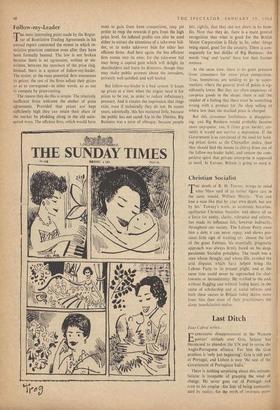Follow-my-Leader
MHE most interesting point made by the Regist- rar of Restrictive Trading Agreements in his annual report concerned the extent to which re- strictive practices continue even after they have been formally banned. The law is not broken because there is no agreement, written or un- written, between the members of the price ring. Instead, there is a system of follow-my-leader. The senior, or the most powerful, firm announces its prices; the rest of the firms adjust their prices so as to correspond—in other words, so as not to compete by price-cutting.
The reason they do this is simple. The relatively inefficient firms welcome the shelter of price agreements. Provided that prices are kept sufficiently high they can retain their share of the market by plodding along in the old unin- spired ways. The efficient firm, which would have most to gain from keen competition, may yet prefer to reap the rewards it gets from the high price level. Its inflated profits can also be used either to attract the attentions of a take-over bid- der, or to make take-over bids for other less efficient firms. And here again, the less efficient firm comes into its own; for the take-over bid may bring a capital gain which will delight its shareholders and leave its directors, though they may make public protests about the intruders, privately well satisfied, and well heeled.
But follow-my-leader is a bad system. It keeps up prices at a' time when the urgent need is for prices to be cut, in order to reduce inflationary pressure. And it creates the impression that rings exist, even if technically they do not. In recent years, admittedly, this has mattered little, because the public has not cared. Up to the Thirties, Big Business was a term of obloquy, because people felt, rightly, that they did not share in its bene- fits. Now that they do, there is a more general recognition that what is good for the British Motor Corporation is likely to be, other things being equal, good for the country. There is con- sequently far less dislike of Big Business: the words 'ring' and 'cartel' have lost their former menace.
At the same time, there is no great pressure from consumers for more price competition. True, housewives are tending to go to super- markets, where the general level of prices is sig- nificantly lower. But they are often suspicious Of cut-price goods in the shops; there is still 'the residue of a feeling that there must be something wrong with a product (or the shop selling it) where less than the marked price is charged.
But this consumer -foolishness is disappear- ing; and Big Business would probably become more unpopular, too, if times grow harder; cer- tainly it -would. not survive a depression. If the Government is as convinced of the need for hold- ing prices down as the Chancellor insists, then 'they should find the means to chivvy firms out of the folloW-my-leader habit, and restore the com- petitive spirit that private enterprise is supposed to instil. In Europe, Britain is going to need it.


































 Previous page
Previous page